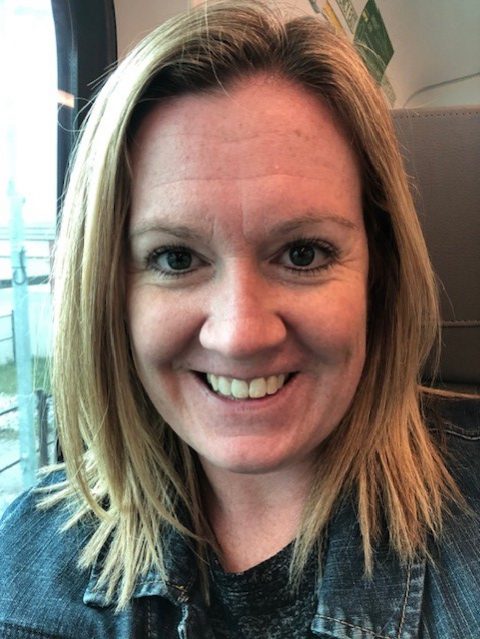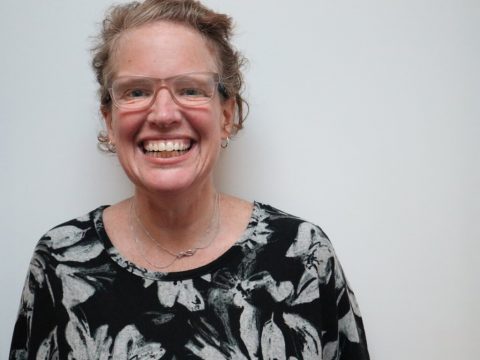QI Innovations Conference 2024
Building a Culture of Quality
April 23, 2024
9:00am – 9:30am (EST)
Opening Ceremonies
Welcome Remarks
 Camille Quenneville, CEO Canadian Mental Health Association, Ontario Division
Camille Quenneville, CEO Canadian Mental Health Association, Ontario Division
Camille Quenneville is the CEO of Canadian Mental Health Association, Ontario Division. Before joining CMHA Ontario, Camille channeled her passion for mental health care in senior leadership roles in the educational, governmental and children’s mental health sectors. Camille is an alumnus of the University of Windsor and the University of Toronto.
Land Acknowledgement
 Eleni Tsoutsias
Eleni Tsoutsias
Director, Policy, Quality & System Transformation, Addictions and Mental Health Ontario (AMHO)
Opening Remarks from a Special Guest
 Anna Greenberg-Executive Vice-President and Chief Operating Officer, Ontario Health
Anna Greenberg-Executive Vice-President and Chief Operating Officer, Ontario Health
Anna is a highly regarded member of Ontario Health’s senior leadership team, serving in a number of roles since the organization’s beginning. She served as the inaugural Chief of Strategy and Planning and as Chief Regional Officer, Toronto and East, for over two years. She has also held the role of Executive Lead, Equity, Inclusion, Diversity and Anti-Racism. She has a track record of success, excelling in each role.
Anna has led a number of strategic and corporate initiatives and was instrumental in support of Ontario’s Health’s system response to the COVID 19 pandemic. Her commitment to actively listening, engaging and educating has helped Ontario Health better recognize and address barriers to equity.
A former president of Health Quality Ontario, Anna championed improved performance monitoring, public reporting and clinical standards. Prior to that Anna served in policy and strategic roles in the cancer system and at the Ministry of Health.
As Executive Vice-President and Chief Operating Officer, Anna serves as a strategic partner with the CEO, the Board and senior leadership counterparts, providing additional leadership support to our corporate services. She works closely with senior government officials and health system leaders to continue to shape and drive Ontario Health’s vision, mission and values.
9:30am – 10:30am (EST)
Keynote Address: Dr. Ben Chan, Assistant Professor at University of Toronto
The Joys and Opportunities of Improving Quality for Vulnerable Populations in Low-Resource Settings

One would think that quality improvement is easy to do in big budget teaching hospitals with quality departments and sophisticated IT systems. But can you do it if you are in a small, isolated setting with limited resources, serving a vulnerable population? Of course you can! Dr. Chan shares his decades of experience as a front-line rural physician, former CEO of Health Quality Ontario, and now consultant with the World Bank supporting quality initiatives in low- and middle-income countries across five continents. He’ll share tips on how to be nimble, stick to QI basics, measure smartly and set the right culture to achieve success.
Dr. Ben Chan is Assistant Professor of Global Health at the University of Toronto and a leading figure in Canada on strategy and leadership for healthcare quality. Dr. Chan was the inaugural CEO of the Health Quality Councils of Saskatchewan (2003-2007) and Ontario (2007-2012). In recognition of his work in spearheading improvement initiatives in chronic disease management, patient safety and public reporting on quality, Dr. Chan was named in 2006 Canada’s Outstanding Young Health Executive.
Dr. Chan is a consultant at the World Bank and has worked with the WHO and foreign governments in 25 countries spanning 5 continents. He advised on the national quality strategies for Georgia, Uzbekistan & Kyrgyzstan and led or supported quality improvement projects on hypertension, diabetes and childhood growth in Kazakhstan, Tajikistan and several Caribbean states. He is currently developing for the World Bank a tool to assess quality improvement capacity at a national level to identify priorities for investment.
Dr. Chan is also an experienced primary care and emergency department physician and has worked in over seventy rural communities across Canada. He was also the former physician for a remote First Nations community in Northwest Ontario where he helped establish opioid addiction treatment services. He holds a BSc and MD (Toronto), Master of Public Health (Harvard) and Master of Public Affairs (Princeton).
 Moderator: Naushaba Degani, Co-Lead Excellence through Quality Improvement Project, CMHA Ontario Division
Moderator: Naushaba Degani, Co-Lead Excellence through Quality Improvement Project, CMHA Ontario Division
Naushaba Degani joined CMHA Ontario in November, 2019 as the Director of Quality Improvement; in Sept, 2022, she became the Chief Quality and System Performance Officer. She has worked in health system performance and evaluation for more than 25 years and has a PhD and an MHSc from the Dalla Lana School of Public Health, University of Toronto as well as a BScH from Queen’s University (Cha Gheill!). She comes to us from Health Quality Ontario (now part of Ontario Health) where she worked as the Manager, Performance Measurement supporting public reporting, quality standards and measurement for quality improvement. In addition to strong skills in data and measurement, Naushaba has a background in harm reduction, evaluation and equity assessment.
30 MINUTE HEALTH BREAK – Visit the Mental Health Hub Exhibitor Booth for activities and relaxation techniques, etc. Visit our Sponsors and Exhibitors and the QI Poster Presentations (some with video presentations). Network with conference participants
11:00am – 12:30pm (EST)
Concurrent Sessions (A1-A4)
Presenters share expertise and participants will gain new knowledge and/or a new skill. The presentation will take an interactive approach and explore one of the following four streams related to the conference theme, ‘Building a Culture of Quality‘; Why QI?, The Who of Quality Improvement (QI): Role of People in QI- Engagement and Mobilization, The How of QI: Sowing the Seeds for a Culture of Quality and Sustaining Your Gains: Nurturing the Seeds of a Culture of Quality.
A1: Why QI?
A1: Why QI?A1-1: Our QI Journey Description: In January 2023, The Phoenix Centre was excited to participate in the 3rd cohort of Quest, to gain an increased understanding of our longstanding struggles with recruitment and retention of clinically competent staff. We used a Lean Six Sigma approach to assess our strengths and weaknesses in recruitment and retention practices. One of the biggest outcomes for us was a staff survey “The Good, the bad, the ugly” that invited staff from all levels of the organization to share what was and was not working. Throughout our journey, we learnt that our experiences were only telling us part of the story. With the use a quantitative approach to gathering information, we were able to see that our anecdotal or qualitative data did not always support what the numbers were telling us. There were times when looking at the numbers, it helped us to put the challenges into perspective. Presenter: Janet Cullen (she/her) and Jessica Nitsopoulos, The Phoenix Centre Janet Cullen is a Registered Psychotherapist with a degree in Psychology and a master’s degree in counselling psychology. She has 13 years of clinical experience, working in Virginia, USA and the last decade in Children’s Mental Health in Ontario. Janet is currently a Clinical Manager at the Phoenix Centre and a private practitioner. Through her years of work, Janet has been involved in workshop development as well as in clinical program development, utilizing an attachment and trauma informed approach. Janet is passionate about Continuing Education and increasing the use of a QI framework in decision making. Jessica is a registered psychotherapist, with over a decade of experience providing therapy to children, youth, and their families at the Phoenix Centre. Jessica has a degree in psychology, and a master’s degree in psychotherapy. Throughout her years as a therapist, Jessica has predominantly worked in the area of trauma, through trauma and attachment informed approaches. More recently Jessica has moved into a clinical management role, which has allowed her to further pursue her passion of mentoring other therapists. Jessica is passionate about not only educating others, but continuing to grow her skills through on going professional development. Her role as a clinical manager has allowed her to grow her passion for quality improvement, and to pursue further learnings in this area. She is a strong proponent of enhancing QI culture within the Phoenix Centre. A1-2: Quality Service: Access And Coordination Through Collaboration Description: Like many communities in Ontario, children, youth and families have struggled for many years in navigating and locating high quality mental health services. More often than not, they turn to their family doctor or local emergency room department for assistance and often not until their circumstances have reached high levels of acuteness and risk. In 2022, Kinark Child and Family Services and Peterborough Youth Services made a genuine commitment to address this in a systematic, collaborative and sustainable manner. To do so would require cultural and systemic change in both Agencies and an interdependence that would not only affect each Agency but their partners and the community as a whole. This presentation speaks to the conditions that were required to create the cultural and systemic shift needed to ensure that coordinated access and service to our community was not only successful but sustainable. Presenter: Matt Sheridan MA, MSW, RSW, Peterborough Youth Services and Kelly Robinson, Kinark Child and Family Services Matt Sheridan is the current Program Director for Child and Youth Mental Health at Peterborough Youth Services. Matt began his career in Toronto first working at the Catholic Children’s Aid Society and later Dellcrest Children’s Centre where his child and youth mental health journey began in 1993. Although Matt has spent most of his career as a manager in Child and Youth Mental Health, Matt has also had the opportunity to work in the areas of Youth Justice and Autism. Matt spent the first 14 years of his 18 years at Kinark Child and Family Services here in Peterborough. During his tenure he managed everything from live-in treatment for complex high-risk children and youth to strategic planning, policy development and communications. Matt has a passion for supporting not only children, youth and families but the caring and compassionate professionals who serve them. Kelly Robinson joined Kinark Child and Family Services in August of 2017 and is the Clinical Services Manager for the Peterborough and Northumberland Programs. Kelly began her career working with the Schizophrenia Society of Ontario and the Canadian Mental Health Association, HKPR, where she was involved in establishing the Lynx Early Psychosis Intervention Program. Kelly spent a number of years in Toronto at the Canadian Mental Health Association Early Psychosis Intervention Program. Kelly was a Director at Stella’s Place in Toronto, where she co-led the development of the organization, focusing on the establishment of clinical and recovery programs for young adults. Kelly enjoys supporting professionals within her organization and the wider sector to foster meaningful connections that influence the development and maintenance of high-quality programming for children, youth and families. Beyond work, Kelly enjoys being outside as much as possible to hike, cycle and paddle. Nature is both an inspiration and a balm during exciting as well as troubling times. |
A2: The Who of Quality Improvement (QI): Role of People in QI- Engagement and Mobilization
A2: The Who of Quality Improvement (QI): Role of People in QI- Engagement and MobilizationA2-1: Upward Spiral: How An Informed Environment Inspires Staff-Led Changes Description: The power of feedback from PWLLE motivated our Family/Parent Team to revamp their Family Spiral program to better align it with client needs and incorporate an evolved understanding of problematic substance use. Once the new program had been designed, the team wanted to continue to utilize feedback from PWLLE in their continuous quality improvement journey and requested that an internal client survey be developed. Rideauwood’s QI and Ethics Committee and EDIA Working Group, made up of staff and management from across the agency’s teams, helped shape the evaluation framework. The results are made accessible on a bi-monthly basis to support the Family/Parent team in learning from clients on a more regular basis to support informed ongoing change. This example exemplifies how staff, with consultation from PWLLE, can engage in continuous quality improvement to not only facilitate services but to also shape an organization’s offering of client centred care. Presenters: Katerina Paravalos (She/Her) & Amanda Neilson (She/Her), Rideauwood Addiction and Family Services Katerina Paravalos has extensive experience leading change in both acute and community-based healthcare settings. As the Manager of Quality, Risk and Decision Support at Rideauwood Addiction and Family Services, Katerina grounds her work in a commitment to client-centred care, fostering a culture of continuous improvement through data-driven decision-making. Katerina is dedicated to improving outcomes and quality of care through thoughtful and collaborative leadership. For over twenty years, Amanda Neilson has provided individual and group counselling to youth and adults struggling with problematic substance use, and substance use disorders. In partnership with Algonquin College and Rideauwood Addiction and Family Services, she was the co-creator of the Umbrella Project, a harm reduction framework for post-secondary institutions. She is currently the Manager of Clinical Practice at Rideauwood. Amanda also has had the pleasure of teaching addictions in the social service worker program at Algonquin College and has a part-time private practice that specializes in treating people with problematic substance use/substance use disorders. Throughout her career, Amanda has facilitated trainings for professionals and community members to support a more trauma-informed understanding of substance use disorders. A2-2: Building Success Together: Navigating Quality Improvement And Team Engagement In Muskoka, Nipissing, And Parry Sound. Description: Our story emphasizes the role of people in QI, showcasing effective strategies for team involvement, data-driven decision-making, and inclusive communication. We share lessons on fostering a culture of ownership, aligning purpose, and establishing common definitions, culminating in successful outcomes and measurable performance metrics. Our experience underscores that Quality Improvement is indeed a team sport, where active engagement and mobilization lead to transformative results. In our successful quality improvement journey, we utilized robust methodologies and tools such as Lean Six Sigma (LSS), DMAIC, SIPOC, and Wishbone diagram, fostering collaboration through an inclusive approach. Our agenda-driven meetings, with documented reviews and diverse participation, ensured alignment of goals and facilitated open discussions. Engaging external facilitators and involving administration, managers, and QI experts addressed initial skepticism, promoting diverse perspectives in decision-making. Scheduled commitments and a dedication to embracing diverse perspectives significantly enriched comprehension and accommodated various learning styles. Through shared tools and deliberate pace, we achieved high engagement, motivation, and collaboration among three distinct agencies. Presenters: André Cotterall (He/Him), Hands Thefamilyhelpnetwork.ca, Miranda Weingartner (She/Her) Community Counselling Centre of Nipissing, Anna Drexler (She/Her), Simcoe Muskoka Family Connexions and Eduard Orellana (He/Him), Simcoe Muskoka Family Connexions André Cotterall brings over two decades of diverse professional experience to his role as a Business Intelligence and Decision Support Specialist at Hands TheFamilyHelpNetwork.ca. Beginning his career in education, social, and public health research, André contributed to the planning, implementation, and analysis of research projects, gaining a solid foundation in research methodology. As his career progressed, André expanded his expertise into program development, evaluation, and leadership support. Known for his ability to simplify complex concepts, André is a trusted resource among his peers. His extensive knowledge, coupled with certifications as a Lean Healthcare Blackbelt and Prosci Change Management Practitioner, underscores his dedication to driving meaningful change. Miranda Weingartner is a QI enthusiast, especially as it relates to engagement and behavior change. She currently works as Manager of Administration and Non-Clinical Services at the Community Counselling Center of Nipissing. In a former life, she was a Scenarist, working with organizations in crafting a path forward in chaotic times (Climate change mitigation, energy and nuclear non-proliferation and the weaponization of space). Anna Drexler, Organizational Excellence & Accountability Director with Simcoe Muskoka Family Connexions. Over 19 years of experience leading large-scale and small-scale transformation improvement initiatives. Areas of expertise: process analysis, re-design and improvement; auditing; change management; performance management; strategic planning; operational efficiency; risk assessment and mitigation; ISO/OHSAS Standards implementation with progressive certification. Eduard Orellana, a Continuous Improvement/Data & Process Specialist at Simcoe Muskoka Family Connexions, brings over 20 years of expertise in quality assurance, ISO standards compliance, and process optimization. He excels in leading teams, developing training programs, and ensuring regulatory compliance across different sectors. Known for his strong skills in data analysis, Eduard is dedicated to fostering Diversity, Equity, and Continuous Improvement. |
A3: The How of QI: Sowing the Seeds for a Culture of Quality
A3: The How of QI: Sowing the Seeds for a Culture of QualityA3-1: How FIREFLY Embeds QI into Organizational Culture Description: We will use three concrete examples to demonstrate how FIREFLY embeds quality improvement into our organizational culture. At the board governance level, we show how our quarterly board reports have evolved from a mad scramble of high-maintenance charts and graphs to an orderly, well-managed system that automatically generates standard reports directly from a range of data files and folders using Power BI. With strategic planning, we showcase how scheduled reminders, a shared document, and Python scripting have transformed the process of displaying monthly operational plan progress. Finally, to support clinical managers, we will demonstrate how an easily-updated Power BI tool put weekly performance data at the fingertips of clinical managers. We are “embedding” quality by allowing our organizational decision-makers and staff to focus on easy-to access information. Presenter: Richard Hill (He/Him), FIREFLY Richard (RP – Former) currently works as a data analyst with FIREFLY, a children’s services organization situated in Northwestern Ontario. He previously worked for several decades as a mental health clinician and educator. His current interests include developing analytical tools in Power BI, administering FIREFLY’s REDCap platform and learning Python. A3-2: Utilizing Experience Based Co-Design To Develop A Mental Health Care Pathway Description: According to Statistics Canada (2022), there has been a 10 percent increase in those aged 15 and older, who are currently diagnosed with a mood disorder; 1 in 3 individuals expressed that they either had unmet or partially met needs when it came to services for their mental health. To address issues of access in Ontario’s Central Region North, an Experience Based Co-design (EBD) approach has been utilized to redesign and build a true regional integrated care pathway for adult depression and anxiety. EBD is an important framework for capturing and understanding the experiences and knowledge of those with lived experience, community and health care providers to examine what is working well, identify gaps, and co-design improvement together. This intentional approach to co-design is necessary in order to improve the experience of those who are experiencing depression or anxiety and reduce the burden on hospital EDs. Presenters: Michael Dunn (He/Him), Waypoint Centre for Mental Health Care, Dike Onuoha (He/Him), Waypoint Centre for Mental Health Care & Helen Bolshaw-Walker (She/Her), Patient/Client and Family Council Michael Dunn has worked in the field of mental health and addictions for 20 years and has served in a variety of positions ranging from street outreach to senior leadership. He is passionate about quality improvement, patient safety and working together with service recipients to co-design improvement. Currently Michael serves as the Director of Health System Integration at Waypoint Centre for Mental Health Care and is a faculty member at the University of Toronto. Dike Onuoha has worked in the field of mental health and addictions for over 14 years, working in a variety of positions from working in the community to Management. Dike has also worked in a variety of positions working with at risk youth. Having the opportunity to work in a collaborative environment to invoke positive changes for the health care system, is a tremendous honor and passion. Currently Dike serves as the Implementation Support Specialist, Health System Integration at Waypoint Centre for Mental Health Care. Helen Bolshaw-Walker has worked in variety of positions, working with the Midlands Police department creating training packages as well as a tutor and mentor to new staff. Helen also worked as a First Contact Adviser supporting her peers who have experienced workplace violence and harassment. As a person with lived experience, and also someone who is part of the LGBTQ+ community I am passionate about equity in health care. It is my firm belief and the belief of the PCFC that patients should be consulted at all levels of decision making where the results of those decisions affect the patient experience. Currently Helen serves as the Experience and Engagement Manager with the Patient/Client and Family Council. |
A4: Sustaining Your Gains: Nurturing the Seeds of a Culture of Quality
A4: Sustaining Your Gains: Nurturing the Seeds of a Culture of Quality
A4-1: Promoting A Quality Culture Through An Enterprise-Wide Performance Measurement Framework
Description: The development and implementation of an enterprise-wide performance measurement framework is a key strategy to promoting and sustaining a culture of quality improvement in community mental health organizations. By aligning program-specific performance measures with overarching organizational goals, a performance measurement framework ensures that every functional unit contributes to the broader mission of delivering high-quality client care. This presentation highlights how such a framework facilitates a data-driven approach to decision-making and cultivates an environment where continuous improvement is not only encouraged but ingrained in the organizational culture. It also describes how we utilize routinely collected community mental health data from the Ontario Perception of Care (OPOC), Ontario Common Assessment of Need (OCAN), and Management Information System (MIS) to measure the Quintuple Aim of improving client and population health, enhancing both client and provider experiences, promoting service efficiency and advancing health equity.
Presenters: Frank Sirotich (He/Him), Canadian Mental Health Association, Toronto Branch
Frank is the Chief Research Officer at the Canadian Mental Health Association Toronto Branch and an Assistant Professor (Status Only) at the Factor-Inwentash Faculty of Social Work at the University of Toronto. Frank leads CMHA Toronto’s research and analytics, improving mental health programs and bridging policy, practice, and research with extensive experience in clinical and leadership roles.
A4-2: Maltby Centre’s Strategy For Staff Buy-In On Our Quality Scorecard
Description: Maltby Centre is the lead CYMH agency for the KLF&;A region, as well as a leading provider of autism services for children and youth. Maltby Centre has been using a Quality Scorecard for the last 3 years (approx.) to monitor indicators in key dimension of quality. This workshop will cover:
-
- Scorecard development: How we come up with the indicators to tie in with our strategic plan, the quadruple aim, and all dimensions of quality.
- Target setting: The engagement process we are going through to set targets that are motivating to staff so we have buy-in (and the mistakes we made in this area in the past).
- Sharing the scorecard: Who updates the scorecard, who reviews it (and mistakes we’ve made here too!)
- Other pieces of work our Quality Committee and Board Quality Committee are doing to increase the culture of quality at Maltby Centre.
Presenters: Cailin Scott (She/Her), Maltby Centre
Cailin is the Manager of Quality Improvement, Accreditation, and Privacy at Maltby Centre in Kingston, Ontario. Cailin has a keen interest in QI and has been with Maltby Centre through the introduction of a scorecard, Quality Committee, Board Quality Committee, two Quest projects, and the IDEAS ALP Program.
1 HOUR LUNCH- Visit the Mental Health Hub Exhibitor Booth for activities and relaxation techniques, etc. Visit our Sponsors and Exhibitors and the QI Poster Presentations (some with video presentations). Network with conference participants
1:30pm – 3:00pm (EST)
Concurrent Sessions (B1-B4)
Presenters share expertise and participants will gain new knowledge and/or a new skill. The presentation will take an interactive approach and explore one of the following four streams related to the conference theme, ‘Building a Culture of Quality‘; Why QI?, The Who of Quality Improvement (QI): Role of People in QI- Engagement and Mobilization, The How of QI: Sowing the Seeds for a Culture of Quality and Sustaining Your Gains: Nurturing the Seeds of a Culture of Quality.
B1: Why QI?
B1: Why QI?
B1-1: Increasing Client And Staff Engagement In QI Initiatives At Stride
Description: Our presentation will depict a “then vs. now” theme of QI efforts at Stride. Prior to our most recent Strategic Planning process, Stride had a QIP developed by agency leaders and board members. Using Stride’s Strategic Planning process as a catalyst for QI mobilization, new groups of people, including a focus group of Stride’s clients, and stride staff, were engaged in QI. By getting more people involved in Quality Improvement efforts across the agency, we are building a culture of quality, where everyone is engaged in the QI process. New measures for our QIP have been developed by engaging clients and staff in the process.
Presenters: Julie Henshaw (She/Her/They/Them) & Stephanie McCann (She/Her), STRIDE
Julie is a registered Social Worker who has been working in the mental health and addictions field for 20 years. She has her Yellow Belt in Lean Methodologies and enjoys taking on quality improvement activities; over the past 5 years at Stride, Julie has helped to shape Stride’s Quality Improvement Plan as a member of Stride’s quality committee.
Stephanie has worked in the mental health field for 18 years in an administrative position and has been the Quality & Operations Analyst at Stride for the past 6 years. Stephanie completed white and yellow belt training in 2019 and has been a member of the Stride Quality Improvement committee for the past 5 years.
B1-2: The Power Of Coalitions To Improve System Response For Children/Youth Experiencing Mental Health Crisis
Description: In the Central Region North of Ontario, children, youth and their families have been experiencing untimely and inequitable access to mental health crisis services. This is a long-standing issue, leading to poor patient experiences including unnecessary transfers for admissions, long emergency department wait times without support/services and discharges without services in place. To address this, a regional Child & Youth Crisis Task Force functioning as a rapid QI coalition was formed. The collaborative includes membership from hospital and community mental health care providers and people with lived experience. The quintuple aim framework was utilized to ensure change ideas are achieved to reach our shared purpose: to improve patient experiences, reduce wait times and increase equitable access to support services. Key ingredients of the coalition include reaching consensus on focused priorities, building upon trusting partnerships over time, balancing commitments, and utilizing member knowledge/skills to design and implement innovative solutions.
Presenters: Jaime Pachis (she/her) & Meghan Gray (she/her), Waypoint Centre for Mental Health Care
Jaime Pachis, MHSc, Integrated Care Lead, Waypoint Centre for Mental Health Care. Bio: Jaime Pachis is an experienced health professional having supported and managed projects at the municipal health department, academic and provincial agency levels focusing on quality improvement, patient experience and patient safety. Jaime’s current role with Waypoint Centre for Mental Health Care focuses on health system transformation, collaborating with various community partners to improve care experiences of patients, clients and their families in the central north region of Ontario.
Meghan is a results-oriented and dynamic professional with 11+ years of experience in the mental health and addictions field focusing on solving complex problems, continuity of care, care planning and systems integration. She has extensive experience leading and implementing new and continuous improvement programs, building trust with interprofessional healthcare teams and stakeholders, and designing patient-centered education and strategies to drive successful results. She enjoys building relationships with others and is passionate about equity in healthcare.
B2: The Who of Quality Improvement (QI): Role of People in QI- Engagement and Mobilization
B2: The Who of Quality Improvement (QI): Role of People in QI-Engagement and Mobilization
B2-1: Engaging Teams To Engage Teens: Increasing Teen Retention In The BounceBack Program
Description: BounceBack is a free, fast-access guided self help program available across Ontario for participants 15 years and older. Compared to the adult population, engagement of participants in the 15 to 17 year old teen age bracket was significantly lower: 51% of referred adults enrolled, while only 31% of referred teens enrolled. The presentation will describe the project that used a quality improvement framework to improve the teen participant retention rate in the BounceBack program and our outcomes. Quality improvement recommendation action items included input from our client and family advisory council and direct service staff. The changes were measured by several key performance indicators that showed significant improvements from one quarter to another: successful teen referrals increased by %147 (74 to 183); teen assessments held increased by 260% (26 to 91).
Presenter: Dr. Wendy Manel (She/Her) and Shannon Dhillon (She/Her), Canadian Mental Health Association, York Region South Simcoe Branch
Dr. Wendy Manel is a Clinical Psychologist who has several years of experience working with children, adolescents, adults, and families. Dr. Manel has worked in many community mental health agencies and hospital-based psychiatric departments in both Canada and the U.S. including North York General Hospital, McMaster Children’s Hospital, and the University of Michigan Hospital. She has extensive experience providing consultation to intensive services for child and youth mental health including live-in treatment programs and day treatment programs. For several years Dr. Manel practiced as the Trauma-Informed Practice Lead at the Catholic Children’s Aid Society of Toronto. Dr. Manel’s role included leading the organization on their journey to becoming a trauma-informed Child Welfare Agency including the design, development, and implementation of trauma-informed practices across the service continuum. In addition, Dr. Manel provides consultation and training to staff and caregivers regarding trauma and attachment, as well as service recipient’s cognitive, social, and emotional needs with a focus on enhancing the resiliency of service recipients. Dr. Manel currently practices at the Canadian Mental Health Association as part of the Ontario Structured Psychotherapy Program where she provides consultation and training focused on evidence-based interventions for depression, anxiety, and trauma, as well as suicide risk assessment and safety planning.
Shannon Dhillon has been a BounceBack coach at Canadian Mental Health Association – York Region, South Simcoe (CMHA-YSS) for two and a half years. She has contributed to several accessibility-enhancing projects including cultural adaptation of the BounceBack coaching materials in Punjabi, community promotion of the Ontario Structured Psychotherapy Program at Toronto’s Pride Parade and Pride In The Park (Celebrating Diversity and Inclusion). More recently, Shannon played a key role in the QI project to streamline BounceBack services for Teens to increase youth engagement in the program.
B2-2: Engaging The Heart Of QI: Unveiling The Role Of People
Description: This will be a dynamic workshop designed to spotlight the integral role of individuals in the success of quality improvement (QI) initiatives. Drawing insights from the Ontario Structured Psychotherapy – Wait List Management activities, the session navigates the human dimension of QI, emphasizing practical applications of process mapping. Participants will explore strategies for stakeholder mobilization, delve into human-centred process mapping principles, and learn how to foster a culture of collaboration. This workshop equips attendees with actionable tools to engage and mobilize individuals effectively, fostering a collaborative culture that enhances the impact of QI efforts in MH & A organizations. Join us for an interactive session that places people at the heart of successful QI.
Presenters: Laura Daly-Trottier (She/Her), The Excellence through Quality Improvement Project (E-QIP) & Karen Demaline (She/Her), Centre for Addiction and Mental Health (CAMH)
Laura Daly-Trottier is a dedicated professional specializing in Quality Improvement and Data Coaching through the Excellence through Quality Improvement Project (E-QIP). Since October 2016, she has been instrumental in delivering coaching to member organizations in the Mental Health and Addictions sector across Ontario, enhancing culture and capacity for quality care.
Karen Demaline is a Program Consultant (Implementation Specialist) at Provincial System Support Program (PSSP) at CAMH (Centre for Addiction and Mental Health) with over 20 years of experience in the mental health and addictions field. Karen is a passionate advocate for improving the lives of people with substance use and mental health concerns as a social worker with experience in both hospital and community settings. In her current role she enjoys exploring practical applications of implementation, discovering strategies for stakeholder mobilization, and learning how to build a collaborative culture that empowers individuals.
B3: The How of QI: Sowing the Seeds for a Culture of Quality
B3: The How of QI: Sowing the Seeds for a Culture of Quality
B3: Building Futures Together Through Data And Quality At Keystone
Description: Join us on Keystone’s transformative Quality Improvement (QI) journey with our Quest project, dedicated to restructuring and enhancing our brief service delivery. Utilizing QI methodologies and tools, we critically examined our current state, uncovering challenges related to data integrity and feedback mechanisms, prompting us to advocate for pivotal changes within EMHWare, and engage with stakeholders for strategic planning. Our commitment to a continuous improvement mindset led us to celebrate quick wins, implement responsive strategies, and explore the Inclusive Leadership Program to foster EDI principles, and strengthen community bonds. The Quest project’s impact goes beyond restructuring our brief program; it has revitalized our approach, strengthening our collective focus on building better futures for children, youth, and families in our communities through enhanced programs and services.
Presenters: Susan Wilson, MSW, CTIC, RSW (She/Her), Keystone Child, Youth & Family Services, Sarah Beaton (She/Her), Keystone Child, Youth & Family Services, Jessica Murray, MHA, RCT (She/Her), Knowledge Institute on Child and Youth Mental Health and Addictions, and Lamia Moheb (She/Her), Knowledge Institute on Child and Youth Mental Health and Addictions
Susan Wilson has been with Keystone since January 2018. Previous to her role as a Supervisor, Susan supported a partnership program between Keystone and Saugeen First Nation and provided mental health counselling to children, youth and families in Grey and Bruce counties. Susan has previous experience in child welfare, where she spent 12 years in various positions supporting children, youth and families. Susan has a Master of Social Work from the University of Queensland in Brisbane, Australia, and completed her undergraduate work at Guelph University.
Sarah Beaton has been with Keystone since December 2022, where she started as a Mental Health Counsellor and has recently accepted the position of Clinical Supervisor. Sarah’s previous experience includes twenty-one (21) years with CMHA Niagara as a Therapist and in various management positions, as well as one-year developing programming for transitional-aged youth with dual diagnosis at Community Living. Sarah graduated with a Master of Science in Counselling and Applied Psychology from the University of Liverpool and completed her undergraduate work at Brock University.
Jess Murray is a Quality Improvement Specialist at the Knowledge Institute. As a QI coach, she works to support, teach, facilitate discussion, and empower the Quest agency teams. Before joining the CYMHA sector, Jess’s background is in the health care field as a cardiology technologist at the pediatric hospital in Ottawa. She is a recent Master of Health Administration graduate and a Lean Six Sigma Green Belt, currently working towards her Black Belt.
Lamia Moheb (She/her) is a Quality Improvement Specialist at the Knowledge Institute on Child and Youth Mental Health and Addictions. She is an experienced healthcare professional with in-depth and advanced knowledge, skills and expertise in quality improvement and project management. Lamia is a pharmacist by degree, Lean Six Sigma Black Belt, a Project Management Professional, Change Management Professional and a Key Performance Indicators (KPI) Professional who led numerous projects with dynamic teams and partners, most recent ones are Quest cohort program.
B4: Sustaining Your Gains: Nurturing the Seeds of a Culture of Quality
B4: Sustaining Your Gains: Nurturing the Seeds of a Culture of Quality
B4-1: Cultivating Quality: A Journey of Leadership, Engagement And Innovation
Description: “No idea is off the table” should be at the forefront of everyone’s mind. I want you to feel empowered to create, act, be inquisitive and challenge the status quo every day.” This is how every new employee is welcomed to Nucleus in orientation. In three years (and with a new senior leadership team), Nucleus has transformed its culture from one of mistrust, toxicity and brand-aid solutions to one that embodies quality improvement. Through weekly staff newsletters, town halls and staff engagement councils, employees are kept informed were involved in organizational transformation, every step of the way. The backbone of every decision was on quality – whether it be through its people, processes or new systems – all of which underwent significant change since 2020. In a routine staff pulse survey, one staff member commented “Nucleus has come out of the dark ages and into the light.” This workshop will share Nucleus’ journey and demonstrated success.
Presenters: Laura Salisbury, Oliver Blunn, & Karin Archer Myles, Nucleus Independent Living
Since taking over as CEO in September 2020 (following her 11-year tenure with the Mississauga Halton and South West Local Health Integration Networks), Laura has already accomplished what many attempt to do in a decade. She has galvanized staff towards the common focus of modernization and culture transformation, quality improvement, overhauled Nucleus’ digital assets, including the implementation of a new electronic health record and eReferral, improved client experience by 15.6%, increased base funding for programs and services by 18% ($3 million), and re-imagined the administrative structure that has halted staff turnover.
Oliver Blunn is the Chief Operating Officer (COO) at Nucleus Independent Living, a role he has embraced since April 2023. With a deep-seated passion for healthcare and community service, Oliver’s forward-looking leadership at Nucleus Independent Living is paving the way for exciting digital endeavors and organizational growth, underpinned by a steadfast commitment to client-centered care and system improvement. His tenure in healthcare leadership also includes impactful roles at the Mississauga Halton Local Health Integration Network (LHIN), where he focused on health system performance and innovation. Oliver’s foundation in healthcare is built on a comprehensive background in behavioral science and health administration. He holds a Master’s of Health Administration from the Telfer School of Management at the University of Ottawa, where he was recognized for his leadership and academic excellence. His career began with a focus on behavior consultation, where he developed a nuanced understanding of client needs and system improvement through roles at Mackenzie Health and Skylark Children, Youth, and Families, before advancing into strategic and operational leadership positions. At Nucleus, Oliver is accountable for leading the daily business operations and supporting the organization’s growth, transformation, and leadership team. His leadership style is collaborative and inclusive, drawing on experiences from his early career working with children with autism to foster a patient, authentic, and humor-filled work environment. Oliver is driven by a vision to enhance healthcare delivery through innovation, team empowerment, and strategic use of data and technology to streamline operations and improve client outcomes.
Karin is an engaging and stimulating communicator, whose enthusiasm and warmth helps motivate a team to achieve their desired results. She has a strong sense of urgency, initiative and drive to get things done effectively, with high integrity, passion and fun. Prior to starting as an independent consultant, Karin worked in strategic planning positions, both at a large community hospital and world-renowned cancer centre, where she also was the co-lead for patient engagement. She has also held a regional planning position in palliative care. For the past three years, Karin has worked exclusively with Nucleus Independent Living to help transform the organizations’ culture, administrative teams, systems, processes, and strategic areas of focus, such as equity, diversity and inclusion as well as performance-based structures. Karin holds a Masters of Health Administration from the University of Toronto as well as a Bachelor of Arts in Journalism and History from Dalhousie University. She also has a Post-Graduate Certificate in Corporate Communications from Centennial College where she was the recipient of the Doris Whiteside Award.
B4-2: Nurturing Quality Improvement: Growing Together As A Learning Organization
Description: As a learning organization, we are committed to building a culture of quality improvement (QI). We take a multi-faceted approach to maintaining our QI culture which includes our learning organization model and committee.
In this presentation, we will reflect on how we sustain a QI culture, and how others can adopt these approaches. This includes describing our:
-
- Learning organization model, and how it contributes to our QI culture and meaningful sector outcomes.
- QI maturity assessment, and the role of data processes in sustaining culture.
- Staff huddle processes and our ‘Huddle Board’, as a tool for collaborative problem-solving. We will share how we improved these processes using QI tools.
The Knowledge Institute is celebrating our 20th year, and we recognize that maintaining a QI culture is an ongoing effort. This presentation is intended to show the importance of monitoring and adapting in the face of an ever-changing landscape.
Presenters: Emma McDonald (She/Her) & Kassia Malis (She/Her), Knowledge Institute on Child and Youth Mental Health and Addictions
Emma is the Operations and Performance Measurement Specialist at the Knowledge Institute on Child and Youth Mental Health and Addictions. She leads internal quality improvement, performance measurement, evaluation and planning processes. She has 7+ years of experience supporting healthcare, public health and Indigenous health agencies with planning, evaluation, performance measurement and quality improvement.
Kassia Malis is a Quality Improvement Specialist at the Knowledge Institute on Child and Youth Mental Health and Addictions. She developed a keen interest in quality improvement while working as a Registered Nurse in the acute care hospital setting. She has a master’s degree in Healthcare Quality and is Black Belt certified in Lean Six Sigma. She is passionate about empowering frontline individuals to be a part of the solutions to problems in healthcare by helping them to develop the skills and tools needed to effectively evoke positive change.
30 MINUTE HEALTH BREAK – Visit the Mental Health Hub Exhibitor Booth for activities and relaxation techniques, etc. Visit our Sponsors and Exhibitors and the QI Poster Presentations (some with video presentations). Network with conference participants
3:30pm – 4:30pm (EST)
Closing Panel
Meaningful Engagement: Partnering with PWLLE in Quality Improvement
Description: Meaningful engagement of PWLLE is something we all strive for. This panel discussion will demonstrate the impact and value of incorporating the expertise and perspectives of PWLLE and their support network(s) in quality improvement initiatives (e.g., projects, working groups, planning tables) as well as explore the continuum of methods to meaningfully support and engage PWLLE and their support network(s) in QI initiatives with the overall aim of advancing the delivery of high-quality MHA care in Ontario.
Panelists:
 Carrie Crawford (She/Her)
Carrie Crawford (She/Her)
Carrie has an educational background in Health Sciences & Pre-Hospital Care. She’s been a part of The Ottawa Hospital Emergency Dept for over 25 years, working as an Administrative Coordinator. During her career she has had the opportunity to engage in multiple initiatives & committees to help provide the best service to both patients and their families. Carrie is also a PWLLE (Persons with Lived and Living Expertise) member currently working with the Ontario Health East Region Eating Disorders Working Group.
After experiencing a pivotal moment in her life, she felt it wasn’t uncommon to feel like her life was unravelling. She believes there is no single approach that is right for everyone, but sharing her journey, the lessons she’s learnt, and everything in between is what has helped her to continue moving forward. Carrie began navigating the Mental Health Care system in 2015, when her 10 yr. old daughter was diagnosed with Anorexia Nervosa. Then in 2017 her youngest daughter was also diagnosed with Anorexia Nervosa, and eventually Bulimia Nervosa. Anorexia starves every organ, including the brain, and nothing could have prepared her for the mental health challenges that went along with it, as well as the multiple admissions, residential treatment, several out-patient programs, and an endless amount of health care providers and appointments for over 9 years now. “It’s definitely been a marathon and not a sprint”.
 Dan Bolton (He/Him)
Dan Bolton (He/Him)
From 15 to 23 Dan survived life on the streets which he finally escaped through an overdose and a rescue by the Addiction Research Foundation. Many people experiencing homelessness including Dan began the Homeless Coalition of ST Thomas (“THC of ST T”) where he has been a frontline peer supporter for the past six years. Dan achieved 30 years of sobriety in various lengths; he is the proud father of 6 wonderful children; and recently graduated from the Fanshawe Paralegal program.
 Dean Valentine (He/Him)
Dean Valentine (He/Him)
Dean is a veteran of The Royal Canadian Navy, his experiences and professional competencies, are gain through 25 years of service to the Canadian Forces Logistics Branch and his over 14 years of volunteer community service work. His employment has been in a wide range of working environments both in Canada and internationally.
It’s important to Dean to self-identify as a member of Toronto’s queer community who is HIV positive having complex medical and mental health challenges, who navigates a mild to moderate cognitive impairment. Due to challenges with his diagnosis of HIV/AIDS, Dean was medically released from the Canadian Forces finding himself challenged navigating a healthcare system unfamiliar to him. His personal journey, both successes and challenges, has inspired his passion to become an advocate for collaborative people-centred holistic community healthcare.
Dean is a board member of Casey House Hospital, an active Community Advisor to the Downtown East Toronto, Ontario Health Team (DET OHT), and the Addictions & Mental Health Ontario Person with Lived and Living Experience Advisory Panel.
He’s was the inaugural Chair of the DET OHT Community Advisory Council and Co-Led Community Engagement Strategies. In addition, Dean is actively involved in community research projects with the HQ Toronto (Innovative Approach to Treating Methamphetamine use), Sinai Health (Co-Author, Culturally Appropriate Care for Diverse Older Adults Living with HIV) and has participated in various peer support programing in the area of Mental Health and Addictions and Skills for Safer Living.
“I want to acknowledge, I come from a place privilege, my story is unique to me, I recognize I may have similar challenges to others and our access to services may vary significantly – I want to commit to learning and assisting with breaking down barriers and those oppressions that impede the provision of equitable access to Healthcare. I firmly believe mental and physical Healthcare spans over a lifetime and Community Healthcare should be, equitable, easy to navigate with seamless access to services, when it is needed, without delay” – Dean Valentine
 Madeleine Luvisa (They/Them)
Madeleine Luvisa (They/Them)
Madeleine Luvisa (they/them) has over 6 years of personal and professional experience supporting system change initiatives within local, provincial, and national mental health systems. Madeleine completed a Bachelor of Social Work at McMaster University and most recently worked as a community engagement specialist for Stepped Care Solutions, a national not-for-profit mental health system consultancy group.
Driven by their own experiences with mental health and system navigation, Madeleine is a fierce advocate for equitable access to high quality mental healthcare for all. Madeleine is passionate about service user engagement, advancing equity in mental health spaces, and disrupting the status quo. Madeleine draws inspiration from the famous Maya Angelou quote: ‘Do the best you can until you know better. Then, when you know better, do better.’
In their free time, Madeleine enjoys exploring Hamilton’s beautiful trails, trying new foods, and listening to music.
Moderator:
 Danyal Martin
Danyal Martin
Danyal Martin is the Director of Clinical Programs at the Mental Health and Addictions Centre of Excellence at Ontario Health.
In this role, Danyal and her team (in collaboration with clinical experts and people with lived experience) are responsible for the development and adoption of clinical performance standards, guidelines, and best practices, along with associated performance metrics.
She has been with the Centre since its early days. Before that, she supported other provincial quality improvement programs at Ontario Health.
Prior to joining Ontario Health, Danyal worked with primary care teams and organizations across the province to improve quality and patient safety, using data and quality improvement techniques.
4:30pm – 5:00pm (EST)
Closing Remarks
Graham Woodward, Vice President, Mental health and Addictions Centre of Excellence (MHA CoE) Ontario Health
 Graham Woodward has focused his career on improving health care policy, planning, and delivery through better use of evidence, data, and collaboration. With the MHA CoE, Graham’s focus is on creating a high-performing mental health and addictions system that delivers demonstrable improvements in outcomes and experience for Ontarians. This will be achieved by building on what has been learned and achieved in other parts of Ontario’s health care system such as cancer, cardiac, and renal, through MHA sector collaboration, and by utilizing the many valuable resources and experiences present at Ontario Health.
Graham Woodward has focused his career on improving health care policy, planning, and delivery through better use of evidence, data, and collaboration. With the MHA CoE, Graham’s focus is on creating a high-performing mental health and addictions system that delivers demonstrable improvements in outcomes and experience for Ontarians. This will be achieved by building on what has been learned and achieved in other parts of Ontario’s health care system such as cancer, cardiac, and renal, through MHA sector collaboration, and by utilizing the many valuable resources and experiences present at Ontario Health.
Prior to joining the MHA CoE, Graham has held leadership roles in several of Ontario’s higher performing systems. He co-led the merger of the Cardiac Care Network and Ontario Stroke Network to create CorHealth Ontario, where he also led the Health System Policy, Planning, and Performance portfolio. Prior to CorHealth Ontario, Graham helped found the Ontario Renal Network (ORN), leading its clinical, planning, performance, and funding portfolios, and held leadership roles with Cancer Care Ontario and the Ontario Ministry of Health, as well as research positions with the Institute for Clinical Evaluative Sciences and the University of Toronto.
























